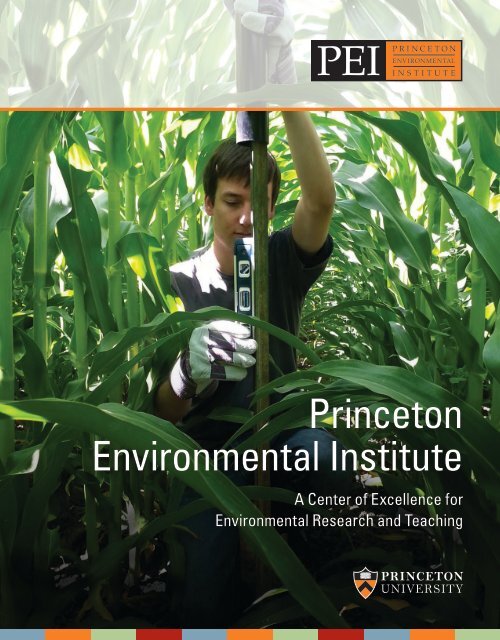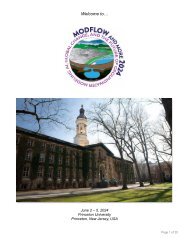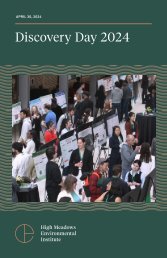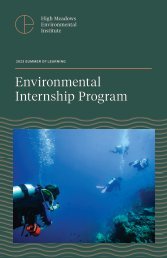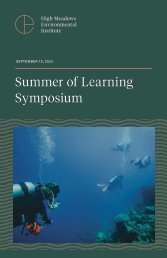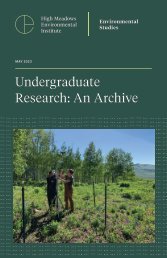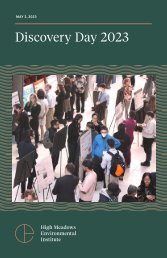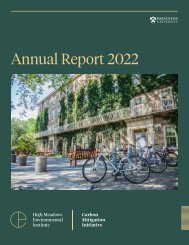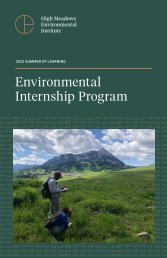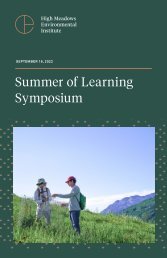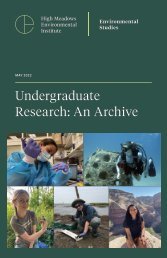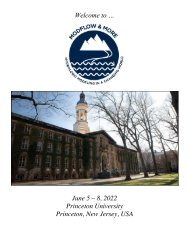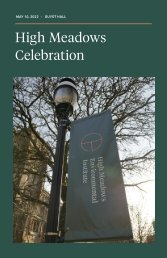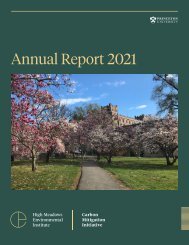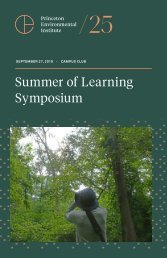PEI Brochure 2018
Founded in 1994, the Princeton Environmental Institute (PEI) is the interdisciplinary center of environmental research, education and outreach at Princeton University. Our mission is to advance knowledge and to develop the next generation of leadership by providing outstanding academic programs and opportunities for advanced scholarship, research and civic engagement.
Founded in 1994, the Princeton Environmental Institute (PEI) is the interdisciplinary center of environmental research, education and outreach at Princeton University.
Our mission is to advance knowledge and to develop the next generation of leadership by providing outstanding academic programs and opportunities for advanced scholarship, research and civic engagement.
Create successful ePaper yourself
Turn your PDF publications into a flip-book with our unique Google optimized e-Paper software.
Princeton<br />
Environmental Institute<br />
A Center of Excellence for<br />
Environmental Research and Teaching
Front Cover: <strong>PEI</strong> summer intern<br />
Matteo Kruijssen ’16 measures<br />
the impact of nitrogen and<br />
water stress on plant growth<br />
and agricultural production.<br />
This page: From high above the<br />
tree canopy in Panama, Environmental<br />
Studies Certificate<br />
students, Dana Miller ’13 and<br />
Eskender McCoy ’14 study how<br />
tropical forests act as sinks<br />
by absorbing carbon from the<br />
atmosphere.
Humanity is facing its greatest challenge: learning to use the environment without destroying it,<br />
so that future generations will have options similar to those we enjoy today. Our understanding<br />
of the environment and of ways to live within its constraints will be, intellectually and strategically,<br />
the most important body of knowledge to be developed in the next quarter of a century.<br />
(Proposal for the Princeton Environmental Institute, August 1993)<br />
W<br />
ith increasing awareness of environmental degradation in the late 1980s, Princeton<br />
University’s leadership laid the foundation for a new interdisciplinary center for<br />
environmental research, education, and outreach at Princeton. Building upon the University’s<br />
disciplinary strengths in the physical sciences and leveraging a pre-existing undergraduate<br />
teaching program in environmental studies, a plan was put in place to position Princeton to<br />
make unique and important contributions.<br />
Founded in 1994, the Princeton Environmental Institute is the interdisciplinary<br />
center of environmental research, education, and outreach at Princeton University.<br />
Nearly a quarter of a century later, Princeton Environmental Institute (<strong>PEI</strong>) serves as a vital<br />
hub of activity on the Princeton campus by bringing together faculty and students from multiple<br />
academic disciplines, along with visitors and collaborating affiliates, to participate in a vibrant<br />
community of scholarship and learning on environmental topics.<br />
<strong>PEI</strong> is globally recognized as a center of excellence in climate science, and also for groundbreaking<br />
work at the intersection of energy and the environment, and in the study of oceans<br />
and atmosphere, bio-complexity, environmental policy, and infectious disease. The Institute’s<br />
instructional programs combine classroom learning with opportunities for guided research and<br />
independent study. The establishment of the Grand Challenges Program—a relatively recent<br />
milestone in <strong>PEI</strong>’s history—has influenced a unique integration of <strong>PEI</strong>’s research and teaching<br />
goals by facilitating interdisciplinary collaborations among faculty while engaging students<br />
as participants in the research enterprise with transformational benefits for their growth and<br />
intellectual development.<br />
The environmental issues that face humanity today are more pressing than ever. There is<br />
urgency for academic institutions to be bold in their leadership and steadfast in their quest for<br />
knowledge and solutions. This brochure provides an overview of <strong>PEI</strong>’s research and teaching<br />
programs. The content is not comprehensive, but rather designed to inspire curiosity about<br />
the work of faculty and students. We invite you to learn more about <strong>PEI</strong>’s many activities and<br />
programs by visiting us on campus and at our website: www.environment.princeton.edu.<br />
Princeton Environmental Institute | A Center of Excellence<br />
1
<strong>PEI</strong>’s mission is to advance<br />
knowledge and to develop the<br />
next generation of leaders by<br />
providing outstanding academic<br />
programs and opportunities for<br />
advanced scholarship and<br />
cutting-edge research with an<br />
environmental focus.<br />
PRINCETON STUDENTS AND FACULTY PARTICIPATING IN <strong>PEI</strong> ACTIVITIES<br />
Banner left to right: Elliot Chang ’16 in the lab; Professor of Ecology and Evolutionary Biology Bryan Grenfell in<br />
the classroom; the annual meeting of the Carbon Mitigation Initiative; Environmental Studies Certificate student,<br />
Zoe Sims ’17, researches carbon sequestration in Costa Rica; Christopher Hamm ’14 participates in a National<br />
Science Foundation funded project to study the impacts of air pollution on cloud formation; Alison Campion ’16<br />
with her Discovery Day poster featuring her thesis research.
Contents<br />
Faculty<br />
Current Highlights 4<br />
Faculty Profiles 6<br />
REsearch<br />
Current Highlights 8<br />
Research Centers 8<br />
Education<br />
Current Highlights 12<br />
Undergraduate Programs 12<br />
Internships and Field Research 14<br />
Graduate Programs 18<br />
OUTREACH<br />
Current Highlights 20<br />
Spotlight on Service 22<br />
LEADERSHIP<br />
Administration, Advisors, Faculty 24<br />
ACKNOWLEDGEMENTS 26<br />
Princeton Environmental Institute | A Center of Excellence<br />
3
Faculty<br />
Current Highlights<br />
120+ Associated Faculty from<br />
29 academic departments<br />
3 senior scholars recruited<br />
as new <strong>PEI</strong> faculty<br />
4 junior faculty hired into<br />
new positions<br />
New faculty chair in<br />
Humanities and the<br />
Environment<br />
<strong>PEI</strong><br />
is recognized internationally as a<br />
center of excellence for environmental<br />
scholarship. The Institute’s reputation<br />
reflects the preeminence of its faculty and<br />
the Institute’s leadership in developing<br />
interdisciplinary collaborations that promote<br />
advances in knowledge. More than 120<br />
Princeton faculty from 29 academic departments<br />
participate actively in <strong>PEI</strong>’s research<br />
and teaching programs.<br />
The establishment of the Thomas A. and<br />
Currie C. Barron Professorship in Humanities<br />
and the Environment and the recruitment of<br />
a prominent scholar to fill that role propels<br />
Princeton into a leadership position in the<br />
environmental humanities—a rapidly growing<br />
and important field of academic inquiry.<br />
<strong>PEI</strong> Faculty/Leadership<br />
Top right moving clockwise: David Wilcove;<br />
Barron Visiting Professors Mary Evelyn<br />
Tucker and John Grim; Bess Ward; Michael<br />
Oppenheimer; Dan Rubenstein; Lars Hedin;<br />
Stephen Pacala.<br />
Left: Jessica Metcalf and Bryan Grenfell.<br />
4
<strong>PEI</strong> draws strength from more than 120 members of the Princeton faculty,<br />
representing 29 academic disciplines, whose research and teaching focuses<br />
on the scientific, technical, policy, and human dimensions of environmental<br />
issues. The Institute functions as a central resource for faculty, post-docs,<br />
students, alumni, and others with interest in environmental topics.
Faculty<br />
<strong>PEI</strong> FACULTY/LEADERSHIP<br />
The faculty pictured on these<br />
two pages are appointed in<br />
<strong>PEI</strong> and/or are leading <strong>PEI</strong>’s<br />
major research centers. For a<br />
complete list of <strong>PEI</strong> Associated<br />
Faculty, see page 25.<br />
Ian C. Bourg Assistant<br />
Professor of Civil and<br />
Environmental Engineering<br />
and the Princeton<br />
Environmental Institute. Research<br />
Interests: Mass fluxes in clay media;<br />
geologic carbon sequestration;<br />
contaminants; isotope geochemistry.<br />
Michael A. Celia<br />
Theodora Shelton Pitney<br />
Professor of Environmental<br />
Studies; Professor of Civil<br />
and Environmental Engineering;<br />
Director, Princeton Environmental<br />
Institute. Research Interests: Carbon<br />
mitigation; groundwater hydrology;<br />
contaminant transport; multi-phase<br />
flow in porous media; geological<br />
storage of carbon dioxide.<br />
Luc Deike Assistant<br />
Professor of Mechanical<br />
and Aerospace Engineering<br />
and the Princeton<br />
Environmental Institute. Research<br />
Interests: Numerical and experimental<br />
studies of turbulent multi-phase<br />
flows in environmental systems; airsea<br />
interaction; waves and breaking<br />
waves; drops and bubbles.<br />
Marc Fleurbaey<br />
Robert E. Kuenne<br />
Professor in Economics<br />
and Humanistic Studies;<br />
Professor of Public Affairs and the<br />
University Center for Human Values;<br />
Co-Director, Climate Futures<br />
Initiative. Research Interests:<br />
Welfare economics; social choice<br />
theory; public economics, and<br />
climate policy.<br />
Bryan T. Grenfell<br />
Kathryn Briger and Sarah<br />
Fenton Professor of<br />
Ecology and Evolutionary<br />
Biology and Public Affairs; Director,<br />
Health Grand Challenge. Research<br />
Interests: Population biology;<br />
infectious diseases; phylodynamics.<br />
Lars O. Hedin George<br />
M. Moffett Professor of<br />
Biology; Professor of<br />
Ecology and Evolutionary<br />
Biology and the Princeton Environmental<br />
Institute. Research Interests:<br />
Ecosystem analysis; cycling of<br />
nutrients and greenhouse trace<br />
gases; microbial processes;<br />
ecosystem structure and function.<br />
Melissa Lane Class of<br />
1943 Professor of Politics;<br />
Co-Director, Climate Futures<br />
Initiative. Research<br />
Interests: Environmental ethics;<br />
political theory and climate change;<br />
science and democracy; ethics of<br />
scientific communication.<br />
Ramanan<br />
Laxminarayan<br />
Senior Research Scholar,<br />
Princeton Environmental<br />
Institute. Research Interests:<br />
Epidemiological models of infectious<br />
diseases and drug resistance;<br />
economic analysis of public health<br />
problems.<br />
Simon A. Levin James S.<br />
McDonnell Distinguished<br />
University Professor in<br />
Ecology and Evolutionary<br />
Biology; Director, Center for<br />
Biocomplexity. Research Interests:<br />
Ecosystem and biosphere-level<br />
patterns and processes; evolution of<br />
diversification; ecology of dispersal;<br />
strain structure in influenza; environmental<br />
economics.<br />
François Morel Albert<br />
G. Blanke, Jr., Professor<br />
of Geosciences and the<br />
Princeton Environmental<br />
Institute. Research Interests: Aquatic<br />
chemistry; biogeochemical cycles;<br />
interactions between chemical and<br />
biological processes in the oceans;<br />
trace elements and primary<br />
production; ocean acidification.<br />
Robert Nixon Thomas<br />
A. and Currie C. Barron<br />
Family Professor in<br />
Humanities and the<br />
Environment; Professor of English<br />
and the Princeton Environmental<br />
Institute. Research Interests: Global<br />
perspectives on environmental literature<br />
and film; environmental justice;<br />
the creative and political challenges<br />
of imagining environmental time.<br />
Michael Oppenheimer<br />
Albert G. Milbank<br />
Professor of Geosciences<br />
and International Affairs;<br />
Woodrow Wilson School and the<br />
Princeton Environmental Institute;<br />
Director, <strong>PEI</strong>-STEP Program.<br />
Research Interests: Science and<br />
policy of the atmosphere; climate<br />
change and impacts; role of nongovernmental<br />
organizations; role<br />
of science and assessment in global<br />
change decision making; precautionary<br />
frameworks.<br />
Stephen W. Pacala<br />
Frederick D. Petrie<br />
Professor in Ecology and<br />
Evolutionary Biology;<br />
Co-Director, Carbon Mitigation<br />
Initiative. Research Interests:<br />
Population biology and community<br />
ecology of plants; theoretical and<br />
mathematical ecology; global<br />
interactions among the biosphere,<br />
atmosphere, and hydrosphere;<br />
carbon mitigation.<br />
6 Princeton Environmental Institute | A Center of Excellence
Amilcare Porporato<br />
Professor of Civil and<br />
Environmental Engineering;<br />
Director, Water and the<br />
Environment Grand Challenge.<br />
Research Interests: Near-wall<br />
turbulence; nonlinear analysis of<br />
hydrologic time series; stochastic<br />
soil moisture dynamics and water<br />
balance; soil-atmosphere interaction;<br />
and ecohydrology, complexity in the<br />
environment and sustainable use of<br />
soil and water resources.<br />
Laure Resplandy<br />
Assistant Professor of<br />
Geosciences and the<br />
Princeton Environmental<br />
Institute. Research Interests:<br />
Influence of ocean circulation on<br />
marine biogeochemistry and<br />
ecosystems; changes in ocean<br />
oxygenation; climate and carbon<br />
cycle interactions; ocean sub-mesoscale;<br />
ocean and climate modeling.<br />
Daniel I. Rubenstein<br />
Class of 1877 Professor of<br />
Zoology; Professor of<br />
Ecology and Evolutionary<br />
Biology; Director, Program in<br />
Environmental Studies; Director,<br />
Development Grand Challenge.<br />
Research Interests: Conservation<br />
biology; behavioral and movement<br />
ecology; evolution of cooperation;<br />
sustainable development.<br />
Joan Ruderman<br />
Senior Biologist, Princeton<br />
Environmental Institute.<br />
Research Interests: Cell<br />
and developmental biology; hormonally<br />
active pollutants; environmental<br />
contributions to cancer; links between<br />
water pollution and biodiversity loss.<br />
<strong>PEI</strong> Faculty Seminar Series<br />
<strong>PEI</strong> hosts a monthly lecture series featuring Princeton faculty speaking on a wide range of topics in environmental<br />
science, technology, policy, and the humanities. The series is unique for its focus on faculty speakers and attracts<br />
more than 150 members of the University and local community as its audience. Recent talks have included:<br />
“Expert Judgment and Uncertainty Quantification for Sea Level Rise” –Michael Oppenheimer<br />
“CO 2<br />
Sequestration in Conventional and Unconventional Reservoirs” –Michael Celia<br />
“Spatio-temporal Dynamics of Childhood Infectious Disease: Predictability and the Impact of Vaccination”<br />
–Bryan Grenfell<br />
“The Iowa Farming Corridor: The Des Moines Prototype” –Mario Gandelsonas<br />
“Lead Exposure and the Black-White Test Score Gap” –Janet Currie<br />
“Goldilocks in Byzantium—Did More Rain Help a Struggling Empire Survive the Arab-Islamic Conquest?”<br />
–John Haldon<br />
“The Bonds We Make and the Bonds We Break: A Chemist’s View of How Metals Drive Biology” –John Groves<br />
“The Deep Ocean Response to Global Warming: Seeking Insight from the Ice Ages” –Danny Sigman<br />
“Probabilistic Coastal Hazards Mapping for the U.S.” –Guy Nordenson<br />
“Competition, Hydraulic Damage, and the Universal Rules Regulating Plant Water Use” –Stephen Pacala<br />
“The Suffering of Wild Animals: Should We Do Anything About It, and if so, What?” –Peter Singer<br />
“Small-scale Fluid Dynamics with Environmental Implications” –Howard Stone<br />
“The Outsized Role of the Southern Ocean in the Regulation of Carbon, Heat, and Biological Productivity”<br />
–Jorge Sarmiento<br />
“Environmental Martyrdom and Defenders of the Forest” –Robert Nixon<br />
“Mathematical Ecology: A Century of Progress, and Challenges for the Next Century” –Simon Levin<br />
“The Complex Politics of International Climate Policy” –Robert Keohane<br />
Jorge L. Sarmiento<br />
George J. Magee Professor<br />
of Geosciences and<br />
Geological Engineering;<br />
Director, Cooperative Institute for<br />
Climate Science; Director, Southern<br />
Ocean Carbon and Climate Observations<br />
and Modeling. Research Interests:<br />
Oceanic cycles of climatically<br />
important chemicals such as carbon<br />
dioxide; study of ocean circulation<br />
using chemical tracers; climate and<br />
ecosystem modeling.<br />
Robert H. Socolow<br />
Professor Emeritus of<br />
Mechanical and<br />
Aerospace Engineering;<br />
Co-Director, Carbon Mitigation<br />
Initiative; Co-Director, Climate Futures<br />
Initiative. Research Interests: Global<br />
energy systems; carbon dioxide capture<br />
and storage; nuclear power; energy<br />
efficiency; deployment of advanced<br />
technologies in developing countries.<br />
Gabriel Vecchi<br />
Professor of Geosciences<br />
and the Princeton<br />
Environmental Institute;<br />
Director, Climate and Energy Grand<br />
Challenge. Research Interests:<br />
Climate science; extreme weather<br />
events; mechanisms of precipitation<br />
variability and change; oceanatmosphere<br />
interaction; detection<br />
and attribution of carbon emissions.<br />
Bess Ward William<br />
J. Sinclair Professor of<br />
Geosciences and the<br />
Princeton Environmental<br />
Institute. Research Interests:<br />
Biogeochemistry; biological<br />
oceanography; microbiology; marine<br />
and global nitrogen cycle.<br />
David S. Wilcove<br />
Professor of Ecology and<br />
Evolutionary Biology and<br />
Public Affairs and the<br />
Princeton Environmental Institute.<br />
Research Interests: Conservation<br />
of biodiversity; agricultural impacts;<br />
invasive species; environmental<br />
policy.<br />
Xinning Zhang<br />
Assistant Professor of<br />
Geosciences and the<br />
Princeton Environmental<br />
Institute. Research Interests:<br />
Microbial physiology and ecology;<br />
biogeochemical cycling; co-evolution<br />
of life and the geochemical environment;<br />
cellular metabolism and stable<br />
isotope records; molecular to global<br />
scale; trace elements and microbial<br />
metabolism; symbiosis.<br />
Princeton Environmental Institute | A Center of Excellence<br />
7
RESEARCH<br />
Current Highlights<br />
$120 million long-term<br />
research projects<br />
43 Principal Investigators<br />
from 18 academic<br />
departments<br />
<strong>PEI</strong> named #2 Climate<br />
Think Tank in the World<br />
by International Center<br />
for Climate Governance<br />
Southern Ocean research<br />
center established with<br />
grant from the National<br />
Science Foundation<br />
Sources of Research Funding<br />
Government<br />
Industry<br />
Foundation<br />
Below: Group photo from the<br />
Carbon Mitigation Initiative<br />
Annual Meeting.<br />
<strong>PEI</strong>’s<br />
environmental research activities<br />
involve faculty and researchers<br />
working across disciplinary lines. More than<br />
40 Princeton faculty from 18 academic<br />
disciplines serve as principal investigators<br />
on <strong>PEI</strong>-based projects including research<br />
focused on global change; climate and<br />
energy; biogeochemical cycles; molecular<br />
geochemistry; biodiversity and conservation;<br />
water; disease ecology; environmental<br />
policy; and sustainable development.<br />
Central to <strong>PEI</strong>’s research activities are<br />
several long-term projects with support<br />
from government, foundation, and industry<br />
sources. These projects are interdisciplinary<br />
endeavers and provide opportunities for<br />
faculty, researchers, and students to push<br />
the edge of discovery in environmental<br />
science, technical innovation, environmental<br />
policy, and human understanding.<br />
The proximity of the Geophysical Fluid<br />
Dynamics Laboratory—one of two U.S.<br />
government climate modeling laboratories—<br />
at the nearby Forrestal campus provides<br />
advantages for collaborations and breakthroughs<br />
in the realm of climate science<br />
and for faculty research in related fields of<br />
inquiry.<br />
The Carbon Mitigation<br />
Initiative (CMI) is a 20-<br />
year-long university-industry partnership that<br />
seeks solutions to the carbon and climate<br />
problem. The program involves over 70<br />
faculty, research associates, and graduate<br />
students from the sciences, engineering, and<br />
policy fields. Research activities are aligned<br />
around projects in climate science, energy<br />
technology, outreach, and integration. CMI’s<br />
annual meeting engages over 100 participants<br />
in dialogue and presentations on innovations<br />
in climate research, technology, and policy.<br />
The Southern Ocean Carbon<br />
and Climate Observations and<br />
Modeling Program (SOCCOM) is transforming<br />
research of the Southern Ocean and advancing<br />
understanding of its role in climate change.<br />
Led by Princeton University, this National<br />
Science Foundation-sponsored program<br />
involves 25 researchers at Princeton and 12<br />
partner institutions. SOCCOM’s observations and<br />
8
<strong>PEI</strong>’s research interests are distinguishable as endeavors involving faculty<br />
and research affiliates working across disciplinary lines.<br />
By deploying a new generation of robotic floats with cutting-edge sensors, we are<br />
building the first real-time, high-resolution, ocean health early-warning system and<br />
transforming research in this remote and previously inaccessible region.<br />
— Jorge Sarmiento, Director, SOCCOM<br />
research findings are shared broadly and are<br />
inspiring a new generation of ocean scientists.<br />
The Cooperative Institute for<br />
Climate Science (CICS) is a<br />
collaboration involving Princeton University<br />
and the National Oceanographic and<br />
Atmospheric Administration’s Geophysical<br />
Fluid Dynamics Laboratory. Established in<br />
2003, CICS engages more than 60 faculty,<br />
researchers, and students from Princeton to<br />
explore the science of climate change and<br />
earth systems modeling.<br />
The Center for<br />
BioComplexity<br />
examines the mechanisms sustaining regional<br />
and global processes that underlie essential lifesupport<br />
systems. More than 20 Princeton faculty,<br />
postdoctoral research scholars, and graduate<br />
students contribute to the project along with<br />
collaborators at 13 other research institutions.<br />
The principal focus of this <strong>PEI</strong>-based center<br />
is to develop new mathematical and empirical<br />
approaches for describing mechanisms that<br />
determine biological complexity and predictable<br />
features of ecological organizations.<br />
Top: Global climate models<br />
produced by researchers<br />
affiliated with CICS simulate<br />
dynamic shifts of carbon<br />
concentrations occurring in<br />
the oceans and atmosphere<br />
and their impact over time.<br />
Above: Researchers affiliated<br />
with SOCCOM are deploying<br />
a robotic observing system<br />
comprised of 200 autonomous<br />
floats with biogeochemical<br />
sensors providing nearly<br />
continuous coverage in time and<br />
horizontal space over the<br />
entirety of the Southern Ocean.<br />
Princeton Environmental Institute | A Center of Excellence<br />
9
RESEARCH<br />
Grand Challenges<br />
Milestones<br />
$23.9 million awarded to<br />
support faculty and student<br />
research<br />
97 research projects funded<br />
involving 100 faculty<br />
20 academic units<br />
participating<br />
1,590 undergraduate field<br />
experiences in 91 countries<br />
40+ new undergraduate<br />
courses<br />
Distribution of Grand<br />
Challenges Research Awards<br />
Physical Sciences<br />
Social Sciences<br />
Engineering<br />
Humanities<br />
The Climate Futures<br />
Initiative (CFI) explores<br />
normative and positive approaches to the<br />
future of humankind as affected by climate<br />
change. The initiative features dialogue<br />
across disciplines and world regions with<br />
special attention to ethics and uncertainty.<br />
A component of CFI is the refinement of<br />
integrated assessment models to address<br />
ethical issues and to improve the treatment of<br />
inequalities and risks. The project involves<br />
faculty and postdoctoral research associates<br />
from architecture, economics, English, environmental<br />
science, engineering, geography, history,<br />
political science, politics, and philosophy.<br />
The Grand Challenges<br />
Program addresses critical<br />
environmental problems of the 21st century<br />
through integrated research and teaching<br />
activities. The program involves cuttingedge<br />
research locally and around the world<br />
and engages a broad cross-section of the<br />
University’s research community. The<br />
program’s academic mission is advanced<br />
through innovations in teaching and learning<br />
including undergraduate courses, internships,<br />
and opportunities for students to work with<br />
faculty on research projects.<br />
Since Grand Challenges was launched<br />
in 2007, research and teaching activities have<br />
focused on environmental issues including<br />
climate and energy, health and infectious<br />
disease, sustainable development in Africa,<br />
water, and urban sustainability.<br />
The Environmental<br />
Humanities Initiative<br />
<strong>PEI</strong>’s Environmental Humanities Initiative<br />
facilitates participation of faculty, research<br />
scholars, and students from the humanities in<br />
the study of environmental subjects. Research<br />
and programming activities are diverse with<br />
opportunities for advancing knowledge and<br />
teaching in the environmental humanities.<br />
The initiative fosters an inclusive dialogue that<br />
encourages insights and new perspectives in<br />
the examination of environmental topics.<br />
Right: With support from<br />
<strong>PEI</strong>’s Urban Grand Challenge,<br />
Princeton faculty are studying<br />
storm surge and flooding in<br />
coastal cities as a consequence<br />
of climate change and are<br />
devising strategies to mitigate<br />
risks and associated damages.<br />
This photographic image,<br />
captured by Professor Jeffrey<br />
Whetstone, highlights the<br />
vulnerability of aging<br />
infrastructure to rising sea<br />
levels in coastal plains.<br />
10 Princeton Environmental Institute | A Center of Excellence
<strong>PEI</strong>’s Environmental Humanities Initiative facilitates broad participation of<br />
faculty, research scholars, and students from the humanities in the study<br />
of environmental subjects.<br />
An active visitors program—the Currie C.<br />
and Thomas A. Barron Visiting Professorship<br />
—has been instrumental in broadening the<br />
conversation at Princeton to include faculty<br />
from multiple departments. Since 2007, <strong>PEI</strong><br />
has appointed 12 academic scholars as<br />
Visiting Barron Professors including joint<br />
appointments in <strong>PEI</strong> and the departments of<br />
anthropology, art and archaeology, English,<br />
religion, philosophy, African American<br />
Studies, and history, as well as with the<br />
School of Architecture, the University Center<br />
for Human Values, and the Lewis Center for<br />
the Arts. Barron Visiting Faculty are supported<br />
as innovators in their respective fields while<br />
making contributions to <strong>PEI</strong>’s research and<br />
teaching programs. The visitors have added<br />
important capacity for the undergraduate<br />
teaching program including courses focused<br />
Scholarship in the environmental humanities is relevant not merely as an<br />
intellectual exercise but because of its potential to significantly impact real<br />
world applications involving climate communications, inter-governmental<br />
negotiations and diplomacy, environmental policy, regional/urban<br />
planning, and in the arts and entertainment. —Thomas A. Barron ‘74<br />
on environmental literature, religion and ecology,<br />
environmental justice, climate ethics, environmental<br />
history, environmental art, multi-species<br />
relationships, and climate and architecture.<br />
Above: Faculty and research<br />
associates affiliated with the<br />
Climate Futures Initiative meet<br />
to address climate risks and<br />
uncertainties.<br />
Left: Programming in the<br />
environmental humanities<br />
includes seminars, lecture<br />
series, and conferences on<br />
climate ethics, religion and<br />
ecology, environmental<br />
justice, the arts, sustainability,<br />
and more.<br />
Princeton Environmental Institute | A Center of Excellence<br />
11
EDUCATION<br />
ENV Program Milestones<br />
775 ENV Certificates<br />
awarded<br />
Students from 31 academic<br />
majors participating<br />
ENV Certificates by Division<br />
Physical Sciences<br />
Social Sciences<br />
Engineering<br />
Humanities<br />
Current Highlights<br />
425+ students enrolled<br />
in ENV courses<br />
130 undergraduates<br />
registered as ENV<br />
Certificate Students<br />
38 ENV Certificates<br />
awarded at Class Day 2016<br />
EducatiNG a generation<br />
of leaders<br />
Top right moving clockwise:<br />
Environmental Studies<br />
Certificate students celebrate<br />
Class Day; students on courserelated<br />
field trip in Panama;<br />
Professors Mario Gandelsonas<br />
and Bruno Carvalho with<br />
students in ENV382 Environmental<br />
Challenges and Urban<br />
Solutions on field trip to<br />
São Paulo, Brazil; Catherine<br />
Riihimaki instructs students<br />
in ENV lab.<br />
<strong>PEI</strong><br />
offers educational programs for<br />
undergraduate and graduate students<br />
as interdisciplinary courses of study.<br />
Undergraduate Programs<br />
<strong>PEI</strong>’s undergraduate programs enhance<br />
learning, knowledge, curiosity, and potential<br />
for contribution.<br />
The Program in Environmental Studies<br />
(ENV) is educating a generation of Princeton<br />
students as leaders to address critical<br />
environmental challenges that they will face<br />
throughout their careers and in life. The<br />
Program offers a broad selection of courses<br />
including laboratory-based exploration,<br />
lectures, seminars, and task force styled<br />
classes with innovative fieldwork on campus,<br />
in the surrounding community, and abroad.<br />
The Environmental Studies curriculum<br />
is designed to meet student interest across<br />
a range of topics and includes courses in<br />
the sciences, social sciences, humanities,<br />
and technical fields. Students wishing to<br />
demonstrate proficiency pursue a Certificate<br />
in Environmental Studies. The ENV Program<br />
is among the largest and most popular<br />
certificate programs at Princeton with<br />
students from 31 academic majors<br />
participating. Undergraduates earning the<br />
Environmental Studies Certificate pursue<br />
diverse opportunities upon graduation<br />
including careers in academia, government,<br />
business, and the non-profit sector.<br />
A new undergraduate course—<br />
The Environmental Nexus—<br />
focuses on four intersecting<br />
environmental challenges that<br />
are expected to reach crisis level<br />
by mid-century: climate change,<br />
food scarcity, water resource<br />
management, and biodiversity loss.<br />
The course explores the scientific, policy, social, and<br />
ethical dimensions of the issues. By engaging students<br />
and faculty from multiple academic disciplines, the<br />
course aims to create the largest possible conversation<br />
within the University community about climate change<br />
and related environmental challenges.<br />
Above: Professor Stephen Pacala delivers lecture on<br />
the Environmental Nexus.<br />
12 Princeton Environmental Institute | A Center of Excellence
Nearly 30 percent of undergraduate students participate with <strong>PEI</strong> during their<br />
four years at Princeton.<br />
<strong>PEI</strong> offers a remarkably wide range of courses and programs that<br />
provide students with the knowledge and skills to understand and<br />
address the most important environmental problems of our time.<br />
— Michael A. Celia, Theodora Shelton Pitney Professor of Environmental Studies<br />
Princeton Environmental Institute | A Center of Excellence<br />
13
EDUCATION<br />
Milestones<br />
1,590 undergraduate<br />
internships and<br />
independant research<br />
projects in 91 countries<br />
88 Princeton faculty have<br />
served as mentors to <strong>PEI</strong><br />
summer interns<br />
At the peak of their careers, today’s undergraduates will be confronted by social<br />
and environmental crises stemming from intersecting issues of climate change,<br />
biodiversity loss, shortages in the global food supply, and a scarcity of fresh water.<br />
Our most important role as educators is to prepare students to be leaders and<br />
innovators in addressing these challenges.<br />
—Stephen Pacala, Frederick D. Petrie Professor of Ecology and Evolutionary Biology<br />
UNDERGRADUATES<br />
PARTICIPATING IN <strong>PEI</strong><br />
EDUCATIONAL PROGRAMS<br />
Top right moving clockwise:<br />
Zoe Sims ’17 conducts field<br />
research in Costa Rica; Joshua<br />
Murray ’18 shares outcomes<br />
from his internship at the annual<br />
Summer of Learning symposium;<br />
Alana Miller ’15 and <strong>PEI</strong>-STEP<br />
graduate student, Mary Kang,<br />
measure methane emissions<br />
from abandoned oil and gas<br />
wells in central Pennsylvania;<br />
Maseray Kamara ’12 discusses<br />
her senior thesis research with<br />
classmate Rachel Blake ’12<br />
at Discovery Day—<br />
an annual poster<br />
show event.<br />
Internships<br />
<strong>PEI</strong> offers a wide range of environmentally<br />
focused internships in the summer months.<br />
As many as 100 Princeton undergraduates<br />
from 20 academic majors participate annually.<br />
These paid fellowships provide exposure<br />
to cutting edge research on environmental<br />
challenges including projects in climate<br />
science, energy technology, disease and<br />
global health, water resource management,<br />
environmental policy, and sustainable<br />
development. All assignments are mentored<br />
by Princeton faculty or a qualified professional<br />
host. More than 50 percent of the student<br />
experiences involve fieldwork overseas. As<br />
interns, students become part of an extended<br />
community of scholars, collaborating and<br />
working to address the critical environmental<br />
problems of today.<br />
Independent Field Research<br />
In addition to the internship program, <strong>PEI</strong><br />
provides resources to support undergraduate<br />
research pursued in connection with student<br />
independent work in the junior and senior<br />
years. Upwards of 70 awards are made<br />
annually to students in the Environmental<br />
Studies Program and to other undergraduates<br />
pursuing environmental topics in their<br />
research. The ENV Program and related<br />
opportunities are open to all students<br />
regardless of academic major.<br />
14
<strong>PEI</strong>’s support has allowed me to design a thesis that weaves together my passions<br />
for the ocean, environmental science, and solution-oriented research. I am studying<br />
how groundwater pollution impacts near-shore coral reefs in Bermuda, and how the<br />
island’s fish populations may help mitigate these effects.<br />
— Zoe Sims ’17, Environmental Studies Certificate Student and Smith-Newton Scholar
EDUCATION<br />
William Van Cleve ‘17<br />
Collected ancient<br />
reef samples in the<br />
Canadian Rockies to<br />
understand historical<br />
environmental conditions.<br />
Helen Park ‘18<br />
Manipulated and<br />
optimized yeast species<br />
for use as biofuels in a<br />
Princeton University lab.<br />
Chris Ferri ‘18<br />
Conducted particle<br />
simulations for small<br />
fusion reactors at<br />
Princeton Plasma<br />
Physics Lab.<br />
Tianay Zeigler ‘18<br />
Optimized solar energy for<br />
use in daily appliances.<br />
Jane Urheim ‘17<br />
Researched how farming<br />
communities in California<br />
are meeting mitigation<br />
requirements to protect<br />
threatened and<br />
endangered species.<br />
Vivan Yao ‘17<br />
Investigated impact of<br />
climate change on<br />
coral reef bleaching in<br />
Bermuda.<br />
William Atkinson ’18<br />
Researched the<br />
biodiversity of singing<br />
insects in the tropical<br />
forests of Costa Rica.<br />
Nicole Neville ‘18<br />
Investigated hematite as<br />
a photoelectrocatalyst in<br />
water splitting to produce<br />
hydrogen for fuel cells.<br />
Angeline Jacques ‘16<br />
Examined the history of<br />
rivers and canals in São<br />
Paulo to improve environmental<br />
management.<br />
16
<strong>PEI</strong> internships immerse students into a world they have never experienced before. Students learn how science is<br />
done and how it can be applied to solve real world problems. The experience is transformative at both a personal<br />
and intellectual level.<br />
— Daniel I. Rubenstein, Class of 1877 Professor of Zoology; Professor of Ecology and Evolutionary Biology; Director, Program in Environmental Studies<br />
Olivia Trase ‘17<br />
Studied plant respiration<br />
in arctic birches in Sweden.<br />
Interns Around the Globe<br />
<strong>PEI</strong> supports nearly 175 undergraduates annually as interns with Princeton faculty and on<br />
independent research projects connected to their senior theses. Since 2007, 1,590 students from<br />
34 academic majors have pursued projects on environmental topics in 91 countries around the<br />
globe. Intern destinations are depicted in orange and have included placement in:<br />
Argentina<br />
Australia<br />
Bahamas<br />
Bangladesh<br />
Belgium<br />
Belize<br />
Benin<br />
Bermuda<br />
Bhutan<br />
Bolivia<br />
Botswana<br />
Brazil<br />
Brunei<br />
Burkina Faso<br />
Cambodia<br />
Canada<br />
Chile<br />
China<br />
Colombia<br />
Costa Rica<br />
Cuba<br />
Denmark<br />
Dominican<br />
Republic<br />
Ecuador<br />
Egypt<br />
El Salvador<br />
Ethiopia<br />
Fiji<br />
Finland<br />
France<br />
Germany<br />
Ghana<br />
Greece<br />
Grenada<br />
Guatemala<br />
Guyana<br />
Haiti<br />
Honduras<br />
Iceland<br />
India<br />
Indonesia<br />
Ireland<br />
Israel<br />
Italy<br />
Jamaica<br />
Japan<br />
Jordan<br />
Kazakhstan<br />
Kenya<br />
Lesotho<br />
Liberia<br />
Madagascar<br />
Malaysia<br />
Maldives<br />
Mexico<br />
Mongolia<br />
Mozambique<br />
Namibia<br />
Nepal<br />
Netherlands<br />
New Zealand<br />
Nicaragua<br />
Nigeria<br />
Norway<br />
Palau<br />
Panama<br />
Peru<br />
Philippines<br />
Poland<br />
Portugal<br />
Russia<br />
Rwanda<br />
Sierra Leone<br />
Singapore<br />
South Africa<br />
South Korea<br />
Spain<br />
St. Lucia<br />
Sweden<br />
Switzerland<br />
Taiwan<br />
Tanzania<br />
Thailand<br />
Trinidad and<br />
Tobago<br />
Turkey<br />
Uganda<br />
United Kingdom<br />
United States<br />
of America<br />
Vietnam<br />
Zambia<br />
Zimbabwe<br />
Alec Getraer ‘19<br />
Analyzed the impact<br />
of fire and termites on<br />
savanna vegetation in<br />
Mozambique.<br />
Amy Xie ‘17<br />
Assessed the impact of<br />
smart grids on electricity<br />
use in China.<br />
Soumya Sudhaker ‘18<br />
Forecasted small farmholders’<br />
agricultural yields<br />
in Zambia using in-field,<br />
cloud-distributed sensing.<br />
Azwad Iqbal ‘19<br />
Studied the role of large<br />
mammalian herbivores on<br />
the savannas in Kenya.<br />
Aubree Andres ’17<br />
Worked to improve the<br />
health of vulnerable<br />
populations in Cambodia.<br />
Ethan Campbell ‘16<br />
Sampled seawater to<br />
evaluate wintertime<br />
nitrogen cycling in the<br />
Southern Ocean.<br />
17
EDUCATION<br />
Milestones<br />
<strong>PEI</strong>-STEP graduates<br />
include 58 alumni from<br />
12 academic disciplines<br />
90 Ph.D. candidates have<br />
participated as Princeton<br />
Energy and Climate<br />
Scholars<br />
Current Highlights<br />
<strong>PEI</strong> hosts a weekly meeting<br />
involving faculty, graduate<br />
students, and practitioners<br />
from the local community<br />
for Conversations on<br />
Environment, Responsible<br />
Energy, and Life (CEREAL)<br />
PECS students authored<br />
and published a comprehensive<br />
report on fusion<br />
energy<br />
$80,000 is awarded annually<br />
to graduate students for<br />
research on water, climate,<br />
and energy topics<br />
Graduate Programs<br />
Graduate students are active participants<br />
in <strong>PEI</strong>’s research community. The Institute<br />
provides support for graduate research<br />
and hosts programs that encourage Ph.D.<br />
candidates to reach across disciplinary lines<br />
to address environmental problems.<br />
<strong>PEI</strong>-STEP Program The <strong>PEI</strong>-STEP Graduate<br />
Fellowship Program enables Ph.D. candidates<br />
in science, engineering, and other academic<br />
disciplines to participate in the Woodrow<br />
Wilson School’s program of Science,<br />
Technology, and Environmental Policy (STEP)<br />
Princeton Energy and Climate Scholars<br />
Ph.D. candidates from diverse disciplinary<br />
backgrounds participate as members of<br />
Princeton Energy and Climate Scholars—<br />
a fellowship group that encourages students<br />
to transcend the boundaries of their fields<br />
in considering environment and energy<br />
topics. Fellows meet monthly as a group and<br />
with members of the Faculty Advisory Board<br />
to share insights from their research. As<br />
many as 20 graduate students with research<br />
expertise ranging from energy security and<br />
energy technology to climate science and<br />
environmental policy participate annually.<br />
EDUCATING STUDENTS<br />
AS LEADERS:<br />
Left to right: <strong>PEI</strong>-STEP Ford<br />
Fellow, Geeta Persaad,<br />
accepted a postdoctoral<br />
fellowship at Sanford University<br />
following graduation; Princeton<br />
Energy and Climate Scholar,<br />
Phillip Hannam, wrote his<br />
dissertation on China’s investment<br />
in the power sector of<br />
developing countries and now<br />
works at the World Bank.<br />
Facing page: Professor<br />
Denise Mauzerall discusses<br />
measurement of methane<br />
leakage with Caleb Gum ’18<br />
and postdoctoral fellow<br />
Stuart Riddick.<br />
while developing an environmental policy<br />
dimension of their doctoral theses. Admitted<br />
students are mentored by STEP faculty in<br />
addition to their departmental advisors. Many<br />
<strong>PEI</strong>-STEP graduates go on to hold leadership<br />
roles including positions in academia,<br />
government, industry, and the non-profit sector.<br />
Graduate Research Awards <strong>PEI</strong> administers<br />
several competitive funds for graduate<br />
research including the Mary and Randall<br />
Hack ’69 Graduate Award for innovative<br />
research on water and water-related topics<br />
and the Walbridge Fund Graduate Award for<br />
research on climate science, climate policy,<br />
and energy projects.<br />
18 Princeton Environmental Institute | A Center of Excellence
Graduate students are active participants in <strong>PEI</strong>’s research community.<br />
The Institute provides support for graduate research and hosts programs that<br />
encourage Ph.D. candidates to reach across disciplinary lines to address<br />
environmental problems.
OUTREACH<br />
<strong>PEI</strong><br />
hosts seminars, lectures, and<br />
conferences throughout the academic<br />
year on a broad range of environmental topics.<br />
Events are open to the public and draw an<br />
audience that includes members of the<br />
University and Princeton-area communities<br />
along with visitors and professional colleagues<br />
from peer institutions and collaborating<br />
partners in academic, industry, government,<br />
and the non-profit sectors. In addition, <strong>PEI</strong><br />
organizes informal forums for dialogue and<br />
discussion. These gatherings serve an<br />
important function by bringing together<br />
members of the University community.<br />
<strong>PEI</strong> OUTREACH ON CAMPUS<br />
AND AROUND THE WORLD<br />
Top to bottom: Artemis<br />
Eyster ‘19 leads a lesson on<br />
conservation for Kenyan<br />
schoolchildren; Princeton<br />
Energy and Climate Scholars<br />
Wei Peng, Janam Jhaveri,<br />
Cleo Chou, and Jane Baldwin<br />
discuss a fusion energy<br />
paper co-authored as a group<br />
project; <strong>PEI</strong> faculty Michael<br />
Oppenheimer presents<br />
at the Faculty Seminar Series<br />
on the challenges of quantifying<br />
sea level rise; His Holiness the<br />
Gyalwa Karmapa visits with<br />
<strong>PEI</strong> faculty and students to<br />
discuss environmental issues.<br />
Recent Programming<br />
“Global Perspectives on Environmental<br />
Justice” lecture series<br />
“Multi-Species Salon” seminar series<br />
“After the Spectacular Image: Art,<br />
Architecture, and the Media of Climate<br />
Change” conference<br />
“What the Arts and Humanities are<br />
Good For” lecture series<br />
“The Art of Environmental Justice in<br />
an Expanded Field” symposium<br />
Service and Community Engagement<br />
<strong>PEI</strong> encourages faculty and students to pursue<br />
service in the local community and around<br />
the globe with connections to its mission as<br />
the interdisciplinary center of environmental<br />
research and teaching.<br />
Facing page: Professor<br />
François Morel introduces<br />
the featured speaker for a <strong>PEI</strong><br />
Faculty Seminar Series event.<br />
20
<strong>PEI</strong> serves the Princeton University community and beyond by bringing scientists,<br />
social scientists, humanists, engineers, and outside experts and leaders together<br />
to share research findings and engage in the study of important environmental<br />
issues. The Institute sponsors a wide variety of faculty and student projects that<br />
improve the quality of communities around the world.<br />
— Michael Oppenheimer, Albert G. Milbank Professor of Geosciences and International Affairs and the Princeton Environmental Institute<br />
21
OUTREACH – SPOTLIGHT<br />
<strong>PEI</strong> faculty are committed to the advancement of knowledge. In 2016, <strong>PEI</strong><br />
Founding Director, Simon Levin, received the National Medal of Science—<br />
the nation’s highest scientific honor—for his research contributions to<br />
understanding biological complexity. Levin was honored by President<br />
Barack Obama at a ceremony at the White House.<br />
<strong>PEI</strong> faculty serve as advisors to intergovernmental bodies, policy makers,<br />
industry leaders, and the public on a wide range of environmental issues.<br />
Michael Oppenheimer, shown here, is a long-time participant with the<br />
Intergovernmental Panel on Climate Change. He and several other Princeton<br />
faculty received the Nobel Peace Prize for their contributions to advancing<br />
knowledge of climate change and mitigating its impacts.<br />
Working as a team, students affiliated with <strong>PEI</strong> and<br />
the Princeton Chapter of Engineers without Borders<br />
designed and installed a water pipeline, bringing fresh,<br />
clean water to a remote village in Peru. Similar student<br />
projects supported by <strong>PEI</strong> have advanced sustainability<br />
by improving infrastructure and resource management<br />
in communities in Kenya, Ethiopia, the Dominican<br />
Republic, and Ghana.<br />
As the centerpiece of her <strong>PEI</strong>-supported Grand Challenges project, Professor<br />
Carolyn Rouse spearheaded construction of a school in Oshiyie, Ghana. The<br />
school’s curriculum focuses on materials science, agriculture, and engineering<br />
as solutions to the problems of local sustainability including water scarcity,<br />
soil erosion, and waste management. The project has inspired undergraduate<br />
and graduate research projects.<br />
22
ON SERVICE<br />
Ph.D. students in the Princeton Energy and Climate Scholars program collaborate to<br />
plan and implement an annual service activity. For the past two years, the group has<br />
mentored local high school students on energy and environment topics with the goal of<br />
fostering student curiosity about careers in science and engineering.<br />
In Kenya, <strong>PEI</strong> summer interns provide educational enrichment to<br />
elementary and grade school students in afterschool Conservation<br />
Clubs. Lesson plans and educational activities, designed and taught<br />
by Princeton students, educate Kenyan students and their families<br />
about resource conservation and land management. The Conservation<br />
Clubs are an extension of a <strong>PEI</strong> research project that is restoring<br />
habitat and sustainable livelihoods in the African savanna.<br />
<strong>PEI</strong> faculty and students actively contribute to Campus as Lab projects aimed at<br />
sustainability improvements on campus. The Campus as Lab concept originated within<br />
the Environmental Studies Program as a multi-year study of water quality in Carnegie<br />
Lake. Subsequent projects involved the installation of monitoring devices on top of Butler<br />
College and the tracking of performance indicators for the University’s first green roof<br />
installation. <strong>PEI</strong> summer interns, shown here, are sampling water quality in the newly<br />
restored Washington Road stream corridor—a principal route for storm water drainage<br />
away from campus.<br />
23
LEADERSHIP<br />
ADMINISTRATION<br />
Michael A. Celia | Director<br />
Katharine B. Hackett | Executive Director<br />
Daniel I. Rubenstein | Director, Program in Environmental Studies<br />
Rajeshri D. Chokshi | Computing Support Specialist<br />
Stacey T. Christian | Manager, Finance & Administration<br />
Caitlin M. Daley | Administrative Assistant<br />
Roberta M. Hotinski | Project Manager, SOCCOM<br />
Frances C. Juhasz | Assistant to the Executive Director<br />
Zachary Kaado | Grants Manager<br />
Morgan Kelly | Manager, Communications<br />
Laura A. Matecha | Department Office Support<br />
Heidi E. Mihalik | Financial Assistant<br />
Angela J. Petsis | Undergraduate Administrator<br />
Lorin Romeo-Romay | Internship Coordinator<br />
Holly Welles | CMI Program Manager<br />
<strong>PEI</strong> EXECUTIVE COMMITTEE<br />
Elie Bou-Zeid | Associate Professor of Civil and Environmental Engineering<br />
Emily A. Carter | Dean, School of Engineering and Applied Science; Gerhard R. Andlinger Professor in Energy<br />
and the Environment; Professor of Mechanical and Aerospace Engineering<br />
Michael A. Celia (Chair) | Theodora Shelton Pitney Professor of Environmental Studies; Professor of Civil and<br />
Environmental Engineering; Director, Princeton Environmental Institute<br />
William A. Gleason | Professor of English; Chair, Department of English<br />
John T. Groves | Hugh Stott Taylor Chair of Chemistry; Professor of Chemistry<br />
Lars O. Hedin | George M. Moffett Professor of Biology; Professor of Ecology and Evolutionary Biology and the<br />
Princeton Environmental Institute; Chair, Department of Ecology and Evolutionary Biology<br />
Melissa Lane | Class of 1943 Professor of Politics; Director, University Center for Human Values<br />
Simon A. Levin | James S. McDonnell Distinguished University Professor in Ecology and Evolutionary Biology<br />
Lynn Loo | Theodora D. ‘78 and William H. Walton III ‘74 Professor in Engineering; Professor of Chemical and<br />
Biological Engineering; Director, Andlinger Center for Energy and the Environment<br />
François Morel | Albert G. Blanke, Jr., Professor of Geosciences and the Princeton Environmental Institute<br />
Stephen W. Pacala | Frederick D. Petrie Professor in Ecology and Evolutionary Biology<br />
Cecilia E. Rouse | Dean, Woodrow Wilson School; Lawrence and Shirley Katzman and Lewis and Anna Ernst<br />
Professor in the Economics of Education; Professor of Economics and Public Affairs, Woodrow Wilson School.<br />
Daniel I. Rubenstein | Class of 1877 Professor of Zoology; Professor of Ecology and Evolutionary Biology; Director,<br />
Program in Environmental Studies<br />
Harold T. Shapiro | President of the University, Emeritus; Professor of Economics and Public Affairs,<br />
Woodrow Wilson School<br />
Howard A. Stone | Donald R. Dixon ‘69 and Elizabeth W. Dixon Professor of Mechanical and Aerospace<br />
Engineering; Chair, Department of Mechanical and Aerospace Engineering<br />
EXTERNAL ADVISORY COUNCIL<br />
Thomas A. Barron ‘74 | Emily Wilson Burns ‘91 | Gordon Douglas Jr., ‘55 | Wesley R. Edens | Carl Ferenbach III ‘64 |<br />
Randall A. Hack ‘69 | Fred Krupp | Ray E. Newton III ‘86<br />
24<br />
Princeton Environmental Institute | A Center of Excellence
<strong>PEI</strong> Faculty/Associated Faculty<br />
Natural Sciences<br />
Astrophysical Sciences | Christopher F. Chyba | Samuel A. Cohen | Robert J. Goldston<br />
Chemistry | Steven l. Bernasek | Andrew B. Bocarsly | John T. Groves | Mohammad R. Seyedsayamdost<br />
Ecology and Evolutionary Biology | Jeanne Altmann | Andrew P. Dobson | Andrea l. Graham | Bryan T. Grenfell |<br />
lars o. Hedin | Henry S. Horn | Simon A. levin | C. Jessica E. Metcalf | Stephen W. Pacala | Robert M. Pringle |<br />
Christina P. Riehl | Daniel I. Rubenstein | Mary C. Stoddard | Corina E. Tarnita | David S. Wilcove<br />
Geosciences | Michael Bender | Stephan A. Fueglistaler | Robert W. Hallberg | Isaac M. Held | John A. Higgins |<br />
Gerta Keller | Adam C. Maloof | François M. Morel | Satish C. Myneni | Tullis C. onstott | Michael oppenheimer |<br />
S. George Philander | Venkatachalam Ramaswamy | laure Resplandy | Jorge l. Sarmiento | Blair Schoene |<br />
Daniel M. Sigman | Gabriel Vecchi | Bess B. Ward | xinning Zhang<br />
Molecular Biology | Bonnie l. Bassler | Adel A. Mahmoud | lee M. Silver<br />
Physics | Curtis G. Callan Jr. | Shivaji l. Sondhi<br />
Psychology | Elke U. Weber<br />
Social Sciences<br />
Anthropology | Joao Biehl | Carolyn M. Rouse<br />
Economics | Cecilia E. Rouse | Harold T. Shapiro<br />
history | D. Graham Burnett | Vera S. Candiani | Jacob S. Dlamini | John F. Haldon | Alison E. Isenberg |<br />
Emmanuel H. Kreike | Erika l. Milam<br />
Politics | Charles R. Beitz | Melissa S. lane | Helen V. Milner | Kristopher W. Ramsay<br />
Woodrow Wilson School | Christopher F. Chyba | Harold A. Feiveson | Marc Fleurbaey | Alexander Glaser |<br />
Bryan T. Grenfell | Robert o. Keohane | Adel A. Mahmoud | Denise l. Mauzerall | C. Jessica E. Metcalf |<br />
Helen V. Milner | Michael oppenheimer | Cecilia E. Rouse | Harold T. Shapiro | lee M. Silver | David S. Wilcove<br />
humanities<br />
Architecture | Stanley T. Allen | M. Christine Boyer | Mario I. Gandelsonas | Guy J. P. Nordenson | Alejandro Zareo-Polo<br />
Art and Archaeology | Esther da Costa Meyer<br />
Comparative Literature | Alexander Nehamas<br />
East Asian Studies | David leheny<br />
English | William A. Gleason | Robert Nixon<br />
French and Italian | Goran Magnus Blix<br />
University Center for human Values | Marc Fleurbaey | Melissa lane | Peter Singer<br />
Gender and Sexuality Studies | Anne McClintock<br />
Lewis Center for the Arts | Paul B. Muldoon | Jeffrey Whetstone<br />
Near Eastern Studies | Michael A. Cook | Bernard Haykel<br />
Philosophy | Alexander Nehamas<br />
Spanish and Portuguese Languages and Cultures | Bruno M. Carvalho | Rachel l. Price<br />
Engineering<br />
Andlinger Center for Energy and the Environment | Eric D. larson | Lynn Loo | Elke U. Weber<br />
Chemical and Biological Engineering | Ilhan A. Aksay | Jay B. Benziger | Pablo G. Debenedetti | lynn loo |<br />
Sankaran Sundaresan | James Wei<br />
Civil and Environmental Engineering | Elie Bou-Zeid | Ian C. Bourg | Michael A. Celia | Maurizio M. Chiaramonte |<br />
Peter R. Jaffe | Ning lin | Denise l. Mauzerall | Catherine A. Peters | Amilcare M. Porporato | James A. Smith |<br />
Erik Vanmarcke | Eric F. Wood | Mark A. Zondlo<br />
Computer Science | Michael J. Freedman | Margaret R. Martonosi | Jennifer l. Rexford | Jaswinder P. Singh<br />
Electrical Engineering | Mung Chiang | Claire F. Gmachl | H. Vincent Poor | Sigurd Wagner | David Wentzlaff | Gerard Wysocki<br />
Mechanical and Aerospace Engineering | Craig B. Arnold | Emily A. Carter | luc Deike | Frederick l. Dryer |<br />
Alexander Glaser | yiguang Ju | Chung K. law | Richard B. Miles | Alexander J. Smits | Robert H. Socolow | Howard A. Stone<br />
Operations Research and Financial Engineering | Rene A. Carmona | Warren B. Powell<br />
Princeton Environmental Institute | A Center of Excellence<br />
25
ACKNOWLEDGMENTS<br />
Princeton Environmental Institute is grateful for the generous support of the following alumni and donors whose<br />
gifts have helped shape <strong>PEI</strong> as a global leader and center of excellence in environmental research, education, and<br />
outreach:<br />
Unrestricted Gifts<br />
Anonymous | Mr. and Mrs. Steve Brown P’03 and P’05 | Arthur M. Crocker ’31 | Jane Wells Ellis W’46 in honor of William<br />
W. Ellis, Jr. ’46 and William W. Ellis, III ’73 | High Meadows Foundation | Edmund A. Stanley, Jr. ‘49 | Frank E. Taplin, Jr. ‘37 |<br />
Lucy Rockefeller Waletzky, M.D. | Sandra Wilson W’56<br />
Faculty<br />
Anonymous | Currie C. and Thomas A. Barron ‘74 | High Meadows Foundation | James C. Pitney ‘39<br />
Visiting Faculty<br />
BP, P.L.C | Currie C. and Thomas A. Barron ‘74 | The John S. and Cynthia Reed Foundation<br />
Grand Challenges<br />
Anonymous | Denver Zoo | Wesley R. and Lynn M. Edens P’18 | Susan Rehm and Joseph D. Gatto ‘78 |<br />
Barry A. Gleichenhaus ’78 | High Meadows Foundation | Monmouth County Audubon Society | George Shenk ‘65 |<br />
Thomas and Stacey Siebel Foundation | Michael P. M. Spies ’79 | Mpala Wildlife Foundation Inc. | Sandra Wilson W’56<br />
Research and Specialized Areas of Study<br />
Gordon Douglas, Jr. ‘55 and Sheila Mahoney | Wesley R. and Lynn M. Edens P’18 | Bert Kerstetter ‘66<br />
Postdoctoral/Graduate Fellowships and Research<br />
Anonymous | William Clay Ford Jr. ’79 and Lisa Vanderzee Ford ’82 | Mary and Randall A. Hack ’69 |<br />
William and Flora Hewlett Foundation | Michael W. Huber ‘49 | Mary and William Kelley ‘40 | Barnabas McHenry ‘52 |<br />
Karl F. Schlaepfer ’49 and Gloria G. Schlaepfer Fund | Walbridge Fund, Ltd.<br />
Environmental Studies Program<br />
Anonymous | Thomas A. Barron ‘74<br />
Undergraduate Research<br />
Thomas A. Barron ‘74 | Chan LLC | Anne and William Charrier ‘69 | The Martha Ehmann Conte ’85 Fund |<br />
Robert and Galewood Colvin in memory of Becky Colvin ‘95 | Charles W. H. Dodge ’51 *53 | Family of John D. Stewart ’37 |<br />
Susan Rehm and Joseph D. Gatto ‘78 | Edmund Hayes Sr. ‘18 | Frederick W. Hayes ‘49 | McGregor Fund | Monsanto Fund |<br />
Carolyn and Jeffrey Leonard ‘85 | Matilda Wise Millard | Elizabeth A. Smith and Ray E. Newton, III ‘86 |<br />
Richard B. Scudder ‘35 | Cathy and Robert I. Solomon ‘82 | Peter W. Stroh ’51 | Walbridge Fund, Ltd.<br />
Lecture Series<br />
Bert Kerstetter ‘66 | Frank E. Taplin, Jr. ‘37<br />
26 Princeton Environmental Institute | A Center of Excellence
Undergraduate students on<br />
a service project.<br />
27
Princeton Environmental Institute<br />
has established itself as an<br />
internationally recognized center<br />
for the interdisciplinary study of<br />
urgent issues about our planet’s<br />
climate, water supply, and<br />
ecosystems. It stands poised to<br />
make even greater contributions<br />
at a time when environmental<br />
science is more important than<br />
ever to the world’s future.<br />
— President Christopher Eisgruber ’83<br />
28
Produced by the Princeton Environmental Institute<br />
Princeton Environmental Institute<br />
Princeton University | Guyot Hall<br />
Princeton, New Jersey 08544-1003<br />
www.environment.princeton.edu<br />
Email: pei@princeton.edu<br />
facebook.com/peipu<br />
twitter.com/Princeton<strong>PEI</strong><br />
youtube.com/user/PrincetonEnvInst<br />
ChingFoster | Design<br />
Bucks Digital | Printing<br />
Printed on Neenah Environment PC100 80# White Cover, 100% post-consumer recycled paper, FSC Certified<br />
Copyright ©2017 by the Trustees of Princeton University<br />
Princeton in the nation’s service and the service of humanity<br />
PRINCETON STUDENTS AND FACULTY PARTICIPATING IN <strong>PEI</strong> ACTIVITIES<br />
Banner left to right: Zachariah Smart ’19 researches the effects of El Niño on the reproductive biology of the Greater Ani;<br />
<strong>PEI</strong> STEP Fellow Amanda Savagian records bird vocalizations at field site in central Panama; Sindiso Nyathi ‘16 presents at<br />
Discovery Day poster event; students in Disease Ecology, Economics, and Policy course; <strong>PEI</strong>’s headquarters in Guyot Hall;<br />
Michelle Greenfield ’18 working in the lab.<br />
Back cover: A selection of <strong>PEI</strong> seminar, event, and course titles.
Guyot Hall | Princeton University | Princeton, New Jersey 08544-1003<br />
www.environment.princeton.edu


